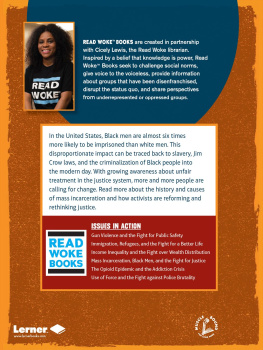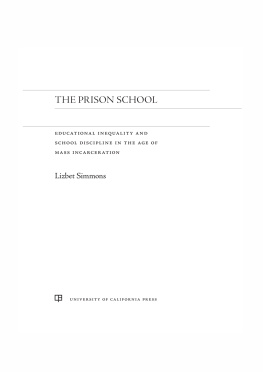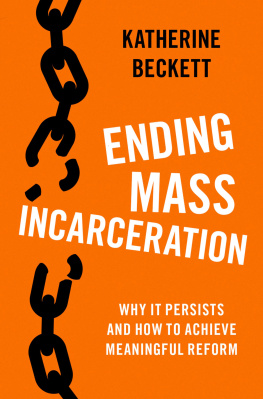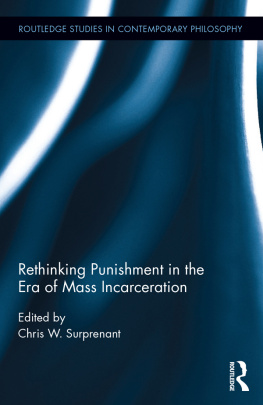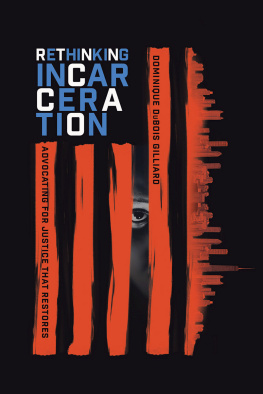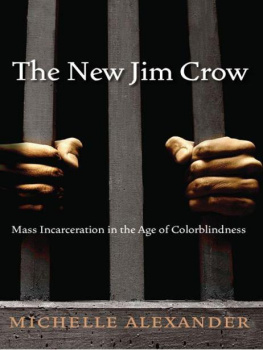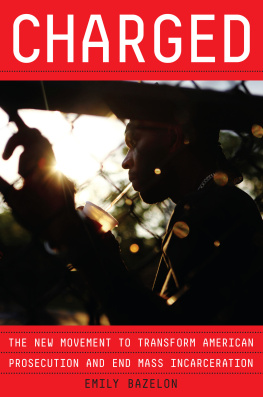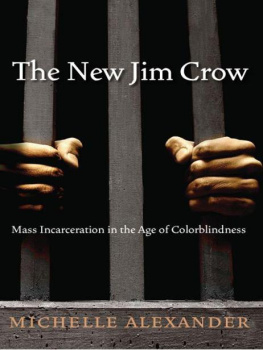More Praise for Understanding Mass Incarceration
Both comprehensive and wonderfully detailed, this book provides a key resource for anyone concerned with the injustices that ground the criminal justice system. Through history, analysis, thorough research, and fresh ideas, Kilgore masterfully draws together the threads of this sprawling system. Maya Schenwar, author of Locked Down, Locked Out
As an organizer, I have been waiting for this book. Mariame Kaba, founder of Project NIA, Chicago
James Kilgore lays out everything the reader needs to gain a picture of the history, dynamics, and reality of mass incarceration and who is affected by it. Well written, documented, and illustrated, this is a must-read for anyone who wants to quickly get up to speed on what mass incarceration means in America today. Paul Wright, editor of Prison Legal News
James Kilgore untangles the threads of bureaucracy and misunderstandings to probe deeply into this human catastrophe, rendering a highly readable and compelling book, convincingly arguing that dismantling mass incarceration is the key civil rights struggle of our time. Roxanne Dunbar-Ortiz, author of An Indigenous Peoples History of the United States
Written in a lively, accessible style, this book offers an introduction to those who are new to the topic as well as insights for the expert.... For anyone wanting a single book to paint a complete picture of the horrors of mass incarceration as well as the heroic resistance to this system of oppression, this would be my first choice. Frank B. Wilderson III, winner of the 2008 American Book Award for Incognegro: A Memoir of Exile and Apartheid
Also by James Kilgore
Prudence Couldnt Swim
Freedom Never Rests
We Are All Zimbabweans Now

2015 by James Kilgore
All rights reserved.
No part of this book may be reproduced, in any form, without written permission from the publisher.
Requests for permission to reproduce selections from this book should be mailed to: Permissions Department, The New Press, 120 Wall Street, 31st floor, New York, NY 10005.
Excerpt from Drug Warz by The Coup on page 71 used by permission.
Published in the United States by The New Press, New York, 2015
Distributed by Perseus Distribution
LIBRARY OF CONGRESS CATALOGING-IN-PUBLICATION DATA
Kilgore, James William, 1947
Understanding mass incarceration: a peoples guide to the key civil rights struggle of our time / James Kilgore.
pages cm
Includes bibliographical references and index.
ISBN 978-1-62097-122-2 (e-book) 1. ImprisonmentUnited StatesHistory. 2. Criminal justice, Administration ofUnited StatesHistory. 3. Alternatives to imprisonmentUnited States. 4. Civil rightsUnited States. 5. CriminalsRehabilitationUnited States. I. Title.
HV9466.K55 2015
365.973dc23
2015008899
The New Press publishes books that promote and enrich public discussion and understanding of the issues vital to our democracy and to a more equitable world. These books are made possible by the enthusiasm of our readers; the support of a committed group of donors, large and small; the collaboration of our many partners in the independent media and the not-for-profit sector; booksellers, who often hand-sell New Press books; librarians; and above all by our authors.
www.thenewpress.com
Book design and composition by Bookbright Media
This book was set in Bembo and DIN
Printed in the United States of America
2 4 6 8 10 9 7 5 3 1
CONTENTS

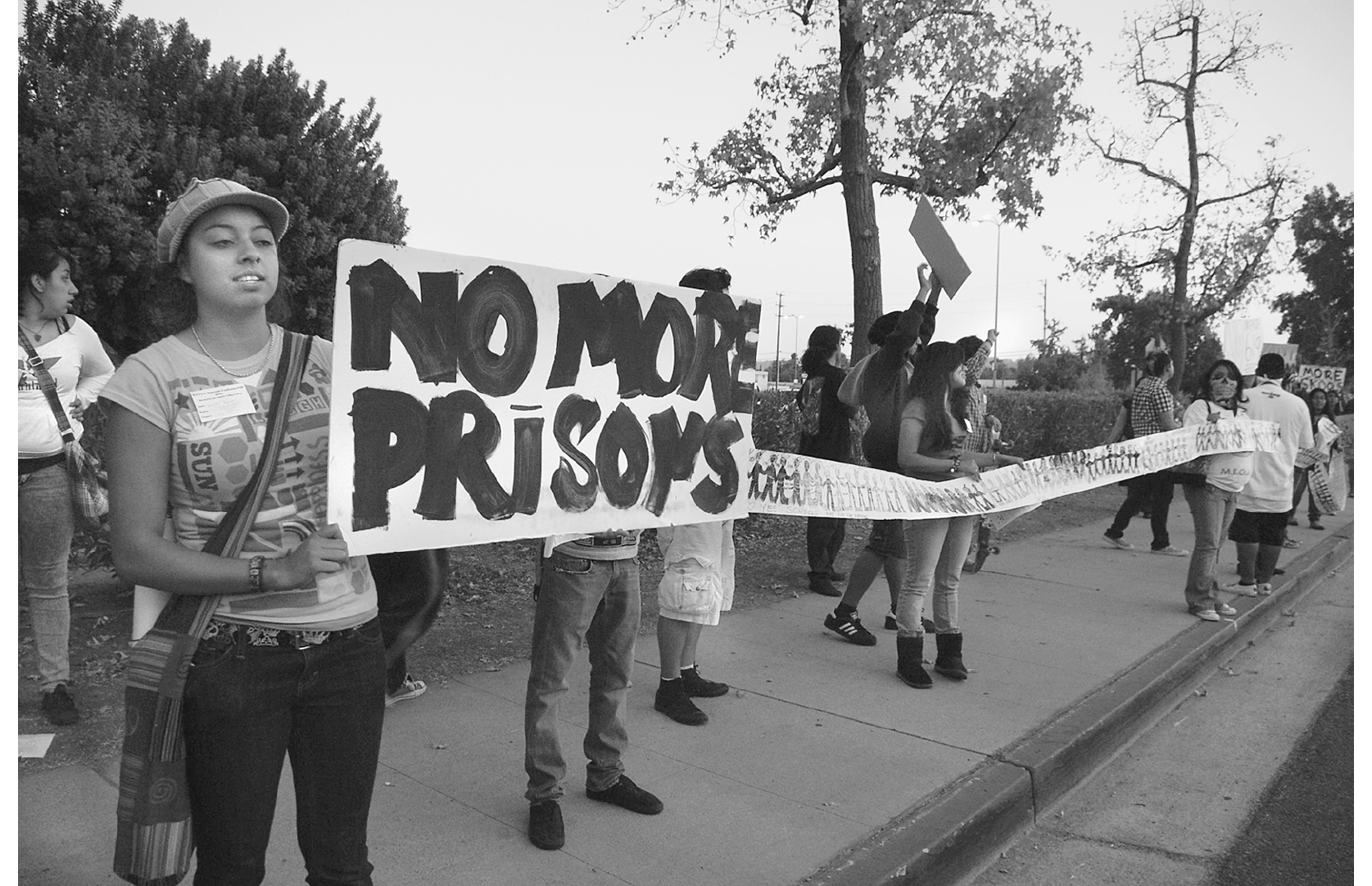
Courtesy of Mary Sutton
In writing Understanding Mass Incarceration, I am attempting to do two things. First and most important, I aim to provide a comprehensive, accessible text on a complex and important topic. For many people, mass incarceration simply refers to the United States excessive use of imprisonmentwe have 25 percent of the worlds prisoners with just 5 percent of the worlds population. Its a tragedy of the first order, but mass incarceration is not just about the number of people behind barsthere are lots of dots to connect.
Mass incarceration is actually one of this countrys key strategies for addressing problems of poverty, inequality, unemployment, racial conflict, citizenship, sexuality, and gender, as well as crime. Hence, when we talk about mass incarceration, we are not speaking only of prison cells or the War on Drugs. A philosophy, a history, and a trail of profit and investment lurk behind the statistics.
Ultimately, mass incarceration is about opportunitynew opportunities for profit and political power for some and the denial of opportunity to others, largely poor people of color. During the past three decades, the urge to punish and incapacitate the most vulnerable sectors of the population has replaced the desire to nurture and develop. As a placard in the photo on says, JAIL EMBODIES OUR FAILURE TO CARE.
Understanding mass incarceration means getting at the root of it, focusing on the fundamental reasons why many states spend more on corrections than on higher education, why nearly 6 million people are denied the right to vote because of their criminal record, why law enforcement cracks down on petty crime in impoverished African American and Latino communities while letting those who loot the economy and commit war crimes go free, and why billions are spent on bailing out Bank of America and General Motors while poor people remain in jail because they cant raise $500 to bail themselves out.
Second, in this book I offer an introduction to the types of actions people are taking throughout the country to oppose mass incarceration. These help bring to life the dynamics of the key civil rights struggle of our time. The actions highlighted hereincampaigns against draconian drug prosecutions, mobilizations to ban the box on employment applications for those with felony convictions, efforts to block jail construction in large urban centers and small Midwestern towns, and lobbying to overturn repressive sentencing and immigration lawsall represent paths to undermining or fundamentally altering mass incarceration.
DIALOGUES, NOT DIATRIBES
Having spent many years of my life both inside and outside prison as an educator, Ive approached each topic in this book by trying to create dialogues for the reader among the various opinions, rather than attempting to offer all the answers (as if anyone really has them). Achieving success in this key civil rights struggle will rest on the capacity of activists and community members to think and act critically. A social movement in opposition to mass incarceration must engage in action but also must promote serious reflection and rigorous debate.
Obviously, I must rely on my own understanding to frame the debates, but Ive tried to offer many perspectives on important issues. The book makes use of multiple sidebars and extracts to highlight the voices of those who are rarely heard in mainstream sources, particularly the formerly incarcerated, their loved ones, and members of their communities. But I also include the words of those who have written or commented on mass incarceration from a variety of other viewpoints, including CEOs of private prison corporations and corrections officials. My intent is to facilitate a process wherein readers can critically analyze the controversy and develop their own perspectives. This type of critical thought is crucial for building a movement based on democracy, not on authoritarian models. We cant afford to create a social movement in opposition to mass incarceration that develops into another structure of oppression.
Next page


